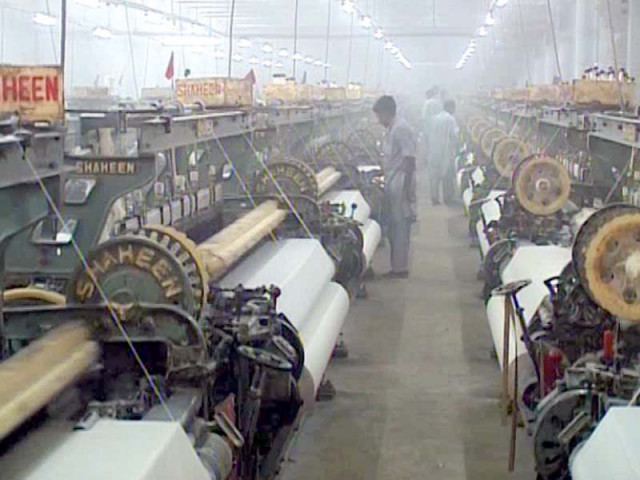Power looms industry in crisis as owners forced to sell
High taxes, policy issues blamed for recent closure of factories, widespread layoffs

Industrialists said that under the weight of such heavy taxes, it had become difficult to continue the power loom operations. PHOTO: EXPRESS
The power loom factories of Faisalabad were first established in 1960. These factories provided jobs for educated and illiterate workers and were set up in various neighbourhoods of Ghulam Muhammad Abad. The production of machine-made garments was a boon for local industry, and the venture proved to be highly profitable, with businesses continually expanding and helping develop the textile sector.
After Ghulam Abad, traders established factories on Jhang Road at Lakri Mandi, Baowala, Sadhar, Thikriwala, and around Jaranwala Road. Expansion of the sector was followed by a steady increase in demand for labour to sustain it. In the fiscal year 2007-2008, the number of power loom units had crossed 300,000 and those employed in direct labour on the machines increased to 70,000. But power outages severely curtailed production between 2008 and 2013. This led to labourers staging protests all over the city and blocking various roads and intersections, while factory owners also ran their own protest campaigns.
Although, load-shedding reduced after the Pakistan Muslim League-Nawaz (PML-N) government came to power in 2013, the industry continued to face other challenges. The government increasingly raised import taxes on yarn, with total duties on account of import duty, regulatory duty, and customs duty running as high as 17%. This was a major problem because the loom industry had only just begun recovering from the power crisis. Some months later, the government imposed an overwhelming 36% duty on polyester imports, making matters worse for the industrial sector.
Industrialists said that under the weight of such heavy taxes, it had become difficult to continue the power loom operations.
Owners claimed that beyond the increases in wages and production costs, rising taxes caught factory owners off guard, as they now had to pay motor tax, professional tax, property tax, civil defence, and social security fees, which heavily cut into profitability. By November 2018, factories began shutting down, a trend that is still ongoing. The All Pakistan Power Loom Association has also been protesting.
Factories are now being sold for a pittance. Factory owners have put up banners saying that, per kilogramme, tomatoes are more valuable than power loom machinery. There are over 300,000 power looms but only 250,000 are currently operating.
Power Looms Owners Association Chairman Waheed Khalid Ramay says over 300 production units have been shut so far, leaving thousands unemployed. Ramay laments that owners were still trying to figure out how to deal with the additional tax burden when they were subjected to more ‘misery’ in the form of cuts in cotton production and misuse of re-export facilities. Ramay adds that Pakistan currently needs 14 million bales of cotton, but production is only going up to 10 million bales. “Loom owners must import cotton to make up for the shortfall of four million,” he said.
Abuzar Ghaffari, who works at a loom factory in Ghulam Muhammad Abad, says many people worked in the local industry for well over 20 years. “They were in absolute shock when they lost their jobs. They didn’t know any other craft and did not know where to go next,” he said. Ghaffari said even the labourers who still have jobs are finding it impossible to make ends meet. Many daily wage workers are forced to buy flour and other basic groceries on credit. They pay shopkeepers when they get money, and many have had to sell their belongings to stay afloat.
Labour union leader Lateef Ansari said he is conducting a campaign for the loom workers’ rights, adding that he is hopeful that the new government will waive some of the taxes imposed by former governments to let the industry get back on its feet.
To complicate matters, a Cloth Market Association member said the prices of garments have also risen because of the power looms’ closure. The price increase has been shifted onto consumers. He thinks prices may be slashed if the power looms industry can return to full capacity.
Meanwhile, Chamber of Commerce President Syed Alamdar Shah said the chamber is working to resolve the issues surrounding the factories. He demanded that the government cut taxes so factories can resume operations and labourers receive a stable livelihood once more.
Otherwise, a knock-on effect could continue.
Published in The Express Tribune, February 5th, 2019.
Like Business on Facebook, follow @TribuneBiz on Twitter to stay informed and join in the conversation.


















COMMENTS
Comments are moderated and generally will be posted if they are on-topic and not abusive.
For more information, please see our Comments FAQ